


 More impressively, up until this year, this Singaporean couple achieved this without even tapping into investments to grow their pot of gold.
It goes without saying that they’re not your typical Singaporeans. So how did two people commit so religiously to their savings, that they’ve amassed an amount that would have taken others much longer to achieve?
Ben generously reached out to share his experience — along with the numbers that allowed them to accomplish this financial feat:
More impressively, up until this year, this Singaporean couple achieved this without even tapping into investments to grow their pot of gold.
It goes without saying that they’re not your typical Singaporeans. So how did two people commit so religiously to their savings, that they’ve amassed an amount that would have taken others much longer to achieve?
Ben generously reached out to share his experience — along with the numbers that allowed them to accomplish this financial feat:| Age | Combined Income nett CPF | Interest @ 1.5% (cash) | Expenditure | Cash Savings |
| 23 | 20,000 | 0 | 12,000 | 8,000 |
| 24 | 53,600 | 120 | 22,000 | 39,720 |
| 25 | 60,000 | 596 | 22,000 | 78,316 |
| 26 | 93,600 | 1,175 | 22,000 | 151,091 |
| 27 | 109,600 | 2,266 | 22,000 | 240,957 |
| 28 | 114,400 | 3,614 | 22,000 | 336,971 |
| 29 | 122,400 | 5,055 | 92,000 | 372,426 |
| 30 | 131,200 | 5,586 | 115,000 | 394,212 |
| 31 | 137,600 | 5,913 | 36,000 | 501,725 |
| 32 | 149,600 | 7,526 | 36,000 | 622,851 |
| 33 | 130,400 | 9,343 | 32,000 | 730,594 |
*Not their real names.
Raised on the Importance of Savings
By the age of 25, Ben and Sarah’s combined cash savings amounted to an impressive $78,000, achieved on average take-home incomes of $2,500 each.
But there’s no beating around the bush here — by the next year, at 26, both of them were earning slightly higher than the median salary of $4,563. But their pile of savings rose in tandem — doubling into $151,000 by the end of the year.
What was more impressive was that at age 28, their average monthly expenditures still hovered around $900 per person, despite each taking home ~$4,750 per month! And by then, their pile of savings had doubled again.
And if you look closely at their numbers you can understand their ‘secret’, from the beginning of their journey in 2010, their savings rate sat at an impressive 40%. Over the years, it continued to rise as their incomes grew, peaking at around 75% to 80% at one point.
In essence, they had kept expenditures low, even as their salaries grew.
[caption id="attachment_775" align="aligncenter" width="640"] This is all going to be worth it…[/caption]
This is all going to be worth it…[/caption]
 This is all going to be worth it…[/caption]
This is all going to be worth it…[/caption]
Living Like University Students
As we looked through the spreadsheet detailing Ben’s financial life since 2010, the couple had largely lived on the budget of university students throughout the earliest stage of their careers.
Even when their salaries peaked, Ben revealed that their budgets and spending never really went beyond $600 each before they got married.
“Our expenses have increased significantly since getting married and moving into our own home. While living with our parents, home-cooked meals and utilities were provided for. We have the best parents, and owe them a debt that goes far beyond money.” Yet even while living with them, Ben still contributed $600 a month for parental allowance.
And as for his lifestyle, whenever he went out with his friends, he felt fortunate that his buddies never had extravagant tastes for expensive food and activities.
[caption id="attachment_776" align="aligncenter" width="640"] Going over budget? IDK her.[/caption]
Going over budget? IDK her.[/caption]
 Going over budget? IDK her.[/caption]
Going over budget? IDK her.[/caption]
A Match Made in Heaven and the Power of Goals
[caption id="attachment_777" align="aligncenter" width="640"] Teamwork makes the dream work![/caption]The fact that Ben and Sarah appeared so in sync, at least financially, was something to behold. To have accumulated $730,000 through savings alone meant that they had an early start to this journey, together.
I was curious as to how they managed to align themselves with each other and asked Ben about it.
Contrary to my belief, not everything had fallen right into place from the get-go. Ben told me about their initial misalignment when it came to personal finance.
“I enjoy thinking about our household finances, but my wife was never keen on looking at spreadsheets and calculating income or expenditure. She simply doesn’t have a natural interest in personal finance, but thankfully we found a system that works for us.”
So just how did they make it work? Ben told me it was the power of goal-setting. And their shared goal was simple: To become a single-income household. They shared a mutual desire to start a family and raise their children themselves.
“We understood that being a single-income family in Singapore is difficult, but we decided to commit to achieving that goal by having a more controlled approach to spending. She understood that it required active effort.”
After that, Ben told me, they “gradually” aligned themselves and found the halfway point. Since then, Sarah’s spending habits have changed to include much more caution. On the other hand, Ben himself had learnt new things from his other half — like the fact that sometimes spending money is not purely about the price tag. “There’s value in the things that we want — I’m thinking about the happiness they can give you. That has value.”
We agreed that it was impossible for everyone to find their perfect match in this way. After all, as Ben put it, “there are a gazillion people in the world.”
“You need a lot of luck to find someone whose values align with yours. But,” he added, “if you’re currently dating, it’s probably important to discuss these issues before marriage.”
Teamwork makes the dream work![/caption]The fact that Ben and Sarah appeared so in sync, at least financially, was something to behold. To have accumulated $730,000 through savings alone meant that they had an early start to this journey, together.
I was curious as to how they managed to align themselves with each other and asked Ben about it.
Contrary to my belief, not everything had fallen right into place from the get-go. Ben told me about their initial misalignment when it came to personal finance.
“I enjoy thinking about our household finances, but my wife was never keen on looking at spreadsheets and calculating income or expenditure. She simply doesn’t have a natural interest in personal finance, but thankfully we found a system that works for us.”
So just how did they make it work? Ben told me it was the power of goal-setting. And their shared goal was simple: To become a single-income household. They shared a mutual desire to start a family and raise their children themselves.
“We understood that being a single-income family in Singapore is difficult, but we decided to commit to achieving that goal by having a more controlled approach to spending. She understood that it required active effort.”
After that, Ben told me, they “gradually” aligned themselves and found the halfway point. Since then, Sarah’s spending habits have changed to include much more caution. On the other hand, Ben himself had learnt new things from his other half — like the fact that sometimes spending money is not purely about the price tag. “There’s value in the things that we want — I’m thinking about the happiness they can give you. That has value.”
We agreed that it was impossible for everyone to find their perfect match in this way. After all, as Ben put it, “there are a gazillion people in the world.”
“You need a lot of luck to find someone whose values align with yours. But,” he added, “if you’re currently dating, it’s probably important to discuss these issues before marriage.”No Doubt About Debt
Ben and Sarah’s impressive track record doesn’t stop at just the huge dollar amount they’ve amassed. Based on their spreadsheet, it looked like they were able to afford their big ticket purchases (home renovations, wedding, and a car!) without taking loans.
Ben confirmed this: “We dipped into our savings to pay for the purchases.”
He went on to explain that his parents were debt-averse people, and that their views had rubbed off on him. “I’m an advocate for no debt, but I understand that’s not always the modern mindset,” he said. “But it wasn’t our preference to take on loans, as that would have added stress to our lives.”
But Ben is quick to recognise that this philosophy towards debt may not apply to everyone. “Sometimes it’s difficult,” he conceded, “Maybe you live far from your workplace, so a car is a necessary, immediate purchase. But personally, I was taught to save for whatever I wanted. So that’s what I did.”
And not only did the couple go without car and renovation loans for their big purchases — they didn’t even make a dent in their savings pile! In fact, it kept growing.
In the two years leading up to their car purchase, Ben and Sarah began working extra hours, with Ben taking on the added load of tuition classes. But anyone would think: their savings and income meant they could take it easy — was the hustle necessary?
 Ben didn’t see it that way, that those upcoming purchases demanded that he work harder for them. In fact, the choice to hustle harder for those few years was borne out of a simple reason: they were still young, had more time, and had more energy.
“It was tiring, so I eventually dropped tuition,” he told me. “But we saw that an opportunity had arisen for us to work more, because we had more time and less commitments, so we simply did. I wouldn’t say that we are exceptionally hardworking.”
It just so happened that they were on their way to these financial goals, and everything worked in their favour. Even their salaries at work, which saw a year-on-year increase till present day.
Ben attributes this salary growth to the nature of the civil service. “It’s common that you’d get a decent increment every year. My wife works in a Japanese company, and their approach is the same.”
Of course, he acknowledges that their higher-than-average salaries gave them a distinct advantage in their savings rate.
“If you’re earning $80,000 a year, saving will likely be easier. But if you’re earning lower than that, putting away something is still better than zero,” he said. “You’ll still be in a better place financially if you just try. And this is not a competition — but if it is, then you’re competing only against yourself.”
And during this time, with such a huge savings pile waiting in the bank, Ben and Sarah maintained their OCBC360 accounts along with a handful of timed deposit accounts with a variety of banks. On average, Ben told me that he was earning 1.5% back on his savings for the last eight years.
“We felt that prices of securities were high over the last four to five years and therefore didn’t make any purchases. We’ve kept our savings in time deposit accounts for quite a number of years, probably losing out on some gains especially with the low interest rate environment. Today’s slashed interest rates are brutal, but it is what it is.”
Ben didn’t see it that way, that those upcoming purchases demanded that he work harder for them. In fact, the choice to hustle harder for those few years was borne out of a simple reason: they were still young, had more time, and had more energy.
“It was tiring, so I eventually dropped tuition,” he told me. “But we saw that an opportunity had arisen for us to work more, because we had more time and less commitments, so we simply did. I wouldn’t say that we are exceptionally hardworking.”
It just so happened that they were on their way to these financial goals, and everything worked in their favour. Even their salaries at work, which saw a year-on-year increase till present day.
Ben attributes this salary growth to the nature of the civil service. “It’s common that you’d get a decent increment every year. My wife works in a Japanese company, and their approach is the same.”
Of course, he acknowledges that their higher-than-average salaries gave them a distinct advantage in their savings rate.
“If you’re earning $80,000 a year, saving will likely be easier. But if you’re earning lower than that, putting away something is still better than zero,” he said. “You’ll still be in a better place financially if you just try. And this is not a competition — but if it is, then you’re competing only against yourself.”
And during this time, with such a huge savings pile waiting in the bank, Ben and Sarah maintained their OCBC360 accounts along with a handful of timed deposit accounts with a variety of banks. On average, Ben told me that he was earning 1.5% back on his savings for the last eight years.
“We felt that prices of securities were high over the last four to five years and therefore didn’t make any purchases. We’ve kept our savings in time deposit accounts for quite a number of years, probably losing out on some gains especially with the low interest rate environment. Today’s slashed interest rates are brutal, but it is what it is.”
 Ben didn’t see it that way, that those upcoming purchases demanded that he work harder for them. In fact, the choice to hustle harder for those few years was borne out of a simple reason: they were still young, had more time, and had more energy.
“It was tiring, so I eventually dropped tuition,” he told me. “But we saw that an opportunity had arisen for us to work more, because we had more time and less commitments, so we simply did. I wouldn’t say that we are exceptionally hardworking.”
It just so happened that they were on their way to these financial goals, and everything worked in their favour. Even their salaries at work, which saw a year-on-year increase till present day.
Ben attributes this salary growth to the nature of the civil service. “It’s common that you’d get a decent increment every year. My wife works in a Japanese company, and their approach is the same.”
Of course, he acknowledges that their higher-than-average salaries gave them a distinct advantage in their savings rate.
“If you’re earning $80,000 a year, saving will likely be easier. But if you’re earning lower than that, putting away something is still better than zero,” he said. “You’ll still be in a better place financially if you just try. And this is not a competition — but if it is, then you’re competing only against yourself.”
And during this time, with such a huge savings pile waiting in the bank, Ben and Sarah maintained their OCBC360 accounts along with a handful of timed deposit accounts with a variety of banks. On average, Ben told me that he was earning 1.5% back on his savings for the last eight years.
“We felt that prices of securities were high over the last four to five years and therefore didn’t make any purchases. We’ve kept our savings in time deposit accounts for quite a number of years, probably losing out on some gains especially with the low interest rate environment. Today’s slashed interest rates are brutal, but it is what it is.”
Ben didn’t see it that way, that those upcoming purchases demanded that he work harder for them. In fact, the choice to hustle harder for those few years was borne out of a simple reason: they were still young, had more time, and had more energy.
“It was tiring, so I eventually dropped tuition,” he told me. “But we saw that an opportunity had arisen for us to work more, because we had more time and less commitments, so we simply did. I wouldn’t say that we are exceptionally hardworking.”
It just so happened that they were on their way to these financial goals, and everything worked in their favour. Even their salaries at work, which saw a year-on-year increase till present day.
Ben attributes this salary growth to the nature of the civil service. “It’s common that you’d get a decent increment every year. My wife works in a Japanese company, and their approach is the same.”
Of course, he acknowledges that their higher-than-average salaries gave them a distinct advantage in their savings rate.
“If you’re earning $80,000 a year, saving will likely be easier. But if you’re earning lower than that, putting away something is still better than zero,” he said. “You’ll still be in a better place financially if you just try. And this is not a competition — but if it is, then you’re competing only against yourself.”
And during this time, with such a huge savings pile waiting in the bank, Ben and Sarah maintained their OCBC360 accounts along with a handful of timed deposit accounts with a variety of banks. On average, Ben told me that he was earning 1.5% back on his savings for the last eight years.
“We felt that prices of securities were high over the last four to five years and therefore didn’t make any purchases. We’ve kept our savings in time deposit accounts for quite a number of years, probably losing out on some gains especially with the low interest rate environment. Today’s slashed interest rates are brutal, but it is what it is.”
The Next Phase: FIRE?
That growing pile of $730,000 has slowed down today. That’s because Ben and Sarah have transitioned into becoming a single-income family. Sarah still works part-time, once or twice a week, but mostly stays home to care for their baby — a goal they’ve always been working towards since the very beginning.
Ben has also started investing, as mentioned above. At age 33, the couple entered the market earlier this year just as economies were starting to weaken because of COVID-19.
But he made clear his belief that investing was not a magic bullet.
“Our approach was to accumulate cash through savings; we saw it as a prerequisite for investing. Yes, saving and investing can be done in tandem, but every person has their own way of planning for their financial future.”
He emphasised that the early years are the “critical years” for saving. “You don’t have that many commitments and you can save at a faster rate. Right now, our best years of saving are behind us. We can’t possibly do it with a child in the picture,” he said frankly. “So that’s what I’d focus on — the first seven to eight years of my career. Even if you’re only saving a little bit, it’s better than zero. There’s no secret.”
So, now that they’ve achieved their goal of becoming a single-income household along with beginning their investing journey, how far away was FIRE (Financial Independence and Retiring Early) for the couple?
[caption id="attachment_779" align="aligncenter" width="640"] Bae… we made it.[/caption]
Bae… we made it.[/caption]
 Bae… we made it.[/caption]
Bae… we made it.[/caption]
“We’ve purchased around $200,000 in equities and are hoping for an opportunity to invest the remaining $500,000. I don’t think I will be working full-time by 45, but I don’t know how things will turn out; even if I earned 4% returns on all my assets and savings, I’d only be getting $28,000 a year – which won’t support my household expenses entirely just yet. But I do think that we have set up a good foundation for what lies ahead.”
“Also, the challenge for me is the long-term uncertainty of markets. I have no idea how our investments will do or return in the future. They could flatline or do very well,” he said, without pretense. “Regardless, we’ve tried to do our best with what we have. Even if we can’t retire early, we know we couldn’t have done more, and we’re happy with that.”











